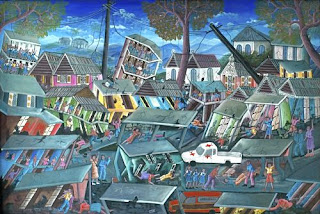When we began this blog it was because we wanted a place to discuss our thoughts on Haitian literature and culture outside of an academic context. How to approach the former was obvious. Two trained literary scholars and professors, avid consumers of books by or about Haitians, books written in French, Kreyòl or English, books of all kinds from all disciplines, our love for reading and learning about and critically analyzing scholarly and literary material related to Haiti was one of the main reasons for this pursuit. It is from this perspective that we share our reviews of books, about our experience in the classroom, contemplate our syllabi, and report on literary festivals. Yet this is not a blog only on literature like Writers of Haiti or Thomas Spear's exhaustive Île-en-île both of which focus exclusively on writing.
The second area, "culture," is perhaps harder to define. There is first "culture" in the sense of traditions, beliefs, and practices that are focused on Haiti. But, as my anthropologist friends enjoy asking what do we really mean by culture? Are we referring to that ubiquitous complex whole which includes beliefs, knowledge, morals arts and institutions? Are we claiming that there is a definitive and exclusive set of the aforementioned that can be labeled as Haitian culture? In other words if culture is always evolving, shouldn't the scope of what we cover in this area always be evolving as well? A cognitive definition of culture extends to the social and communicative aspects of life, which include language, gestures, and various practices. As someone who approaches much of my scholarship from the perspective of cultural studies--a field that stems from literary criticism--I am certainly invested in approaching these topics in a way that is also critical about the position from which I enter and in relation to power relations and social dynamics. There is a difference, cultural studies reminds us, between studying "culture" as in how a group of people bound by a national identity do things and cultures as in subcultural fields. For example Jean-Price Mars' Ainsi parla l'oncle stands as a classic example of an exploration of Haitian culture through a focus on folklore, Kreyòl language and African ancestral roots.
Determining the balance between how we understand culture, and what constitutes culture and how we represent it in this blog has been one of our greatest challenges and achievements. There have been times that we have considered approaching topics such as the presidential election, but were not certain about which cultural angle to take. President Martelly presented a rich opportunity for us to explore the intersection of music, celebrity and politics but we were hesitant to delve into politics with much of the conversation in the Haitian blogosphere already covering this area.
A New York Times article on the celebrated Orchestre Septentrional had a nice quote on the importance of highlighting the sonic elements of Haitian culture. According to Whitney Dow whose documentary "When the Drum is Beating" airs on PBS tonight, “Because music is not just a source of entertainment, but one of the primary elements within Haitian culture, it offers a different path into the country..." Indeed this is one of the main reasons that we find it important to think about culture, both broadly and narrowly in different forms. Yet more often than not our focus on culture has taken it to mean art forms beyond the literary—we’ve had posts on music and painting and in the future you can expect posts on film as well.
To this end one of my goals for our third year will be to post more frequently about visual culture, and in particular on photography. Perhaps through a post on Daniel Morel or Régine Romain, whose work I find so compelling, or through an exploration of how creative writers like Myriam Chancy and Patrick Sylvain also express their artistry through photography. My other goal relates back to one of my posts earlier in the year, the one on Gina Ulysse for the Moun nou section. Because of my own work I have benefited from an amazing community of Haitian scholars, artists, intellectuals and activists whose work inspires me and enriches my scholarship. One of the goals of Moun nou is to profile some of these people in a way that also describes their impact not only in the broad field of Haitian representation, but also on what their work means to us. I suppose this could also be thought of as a way to make what we cover a bit more personal which is one of the benefits of blogging compared to academic writing!
Among the best parts of doing this blog is of course the partnership aspect. Nadève and I have known each other for over a decade, but collaborating on the blog has energized or friendship, sharpened our intellect, and opened us to new ways of thinking. It is truly a transnational exchange between two women--writers, scholars, friends, professors, mothers, and thinkers passionate about engaging Haiti in the arts and the letters--that we continue with pleasure into its third year. So with that I say chapo ba to you my sister blogger, and happy birthday to Tande!
RMJC
RMJC



